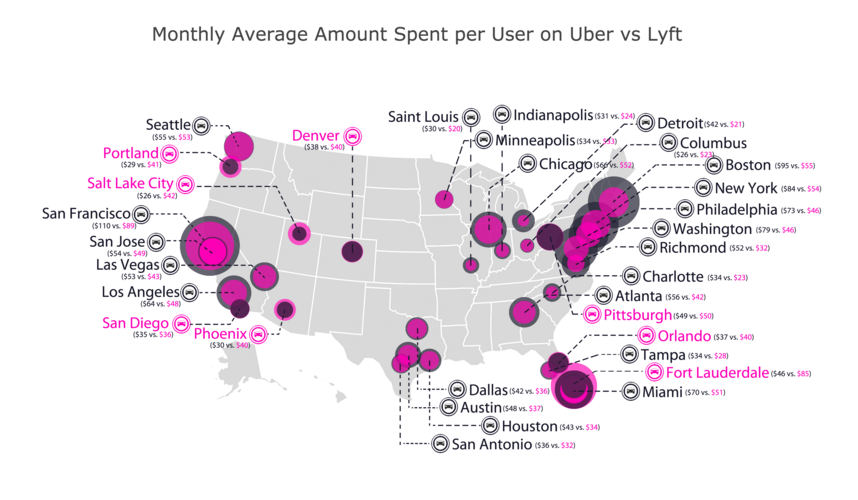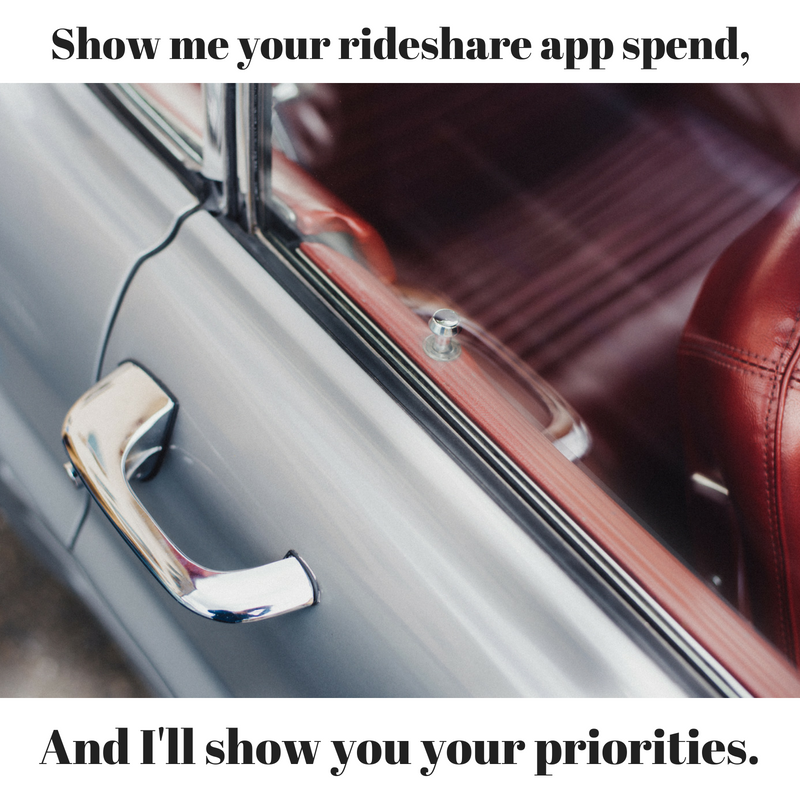Friend, If you use Amazon Prime, Uber or a similar service regularly, you might want to sit down while you read this — we’re about to real talk.
First, try a little test with me.
Tell me how much you spent last month using Amazon, or on your Uber rides.
It’s ok, I’ll wait.
Still waiting…
Gee it’s hard to figure that out, huh?
I’ll give you a break and tell you a secret – you can’t easily and quickly see how much money you’re spending using these services.
Hmm, it’s almost like they sat down and asked themselves,
How might we get people to spend a LOT of money, while not being aware that they’re pouring money into our company?
How might we enable people to feel they’re accessing convenience – no, getting crucial resources for daily life, while dumping their dollars into our bank accounts?
That’s because — they did. The fact that you can’t quickly sum your recent payments is a feature, not a bug.
These services are designed to drain you of money – while masking you from realizing it.
The entire business point of Amazon, Uber and the like is the following:
- Maximize how much money you give them.
- Trick you into thinking they are important or necessary helpers, disempowering you from participating in intentional or local exchanges.
- Exploit, underpay, and overwork workers to maximize their profits.
If that didn’t make you frown, perhaps learning that recently in Germany workers at Amazon went on strike to protest working conditions, and in Spain drivers went on strike to protest Uber will. These are not friendly companies, yall.
So, so many of my friends and clients get to the point in a spending review where we have to come to god around money that’s “somehow missing.” Often, it’s small purchases (which add up fast!) that lead to finding the rest of the paycheck.
When you stop and add it up, you too could realize you’re spending hundreds of dollars a month on Uber – potentially more than you might have spent on a transit pass, taxis, or in some cases a car.
Check out this image from the money app Empower and read more here to find out if you are above average for your city’s rideshare app spending?

Getting things you need and getting home when it’s raining aren’t bad, of course. It’s all about knowing what you money is doing, and picking it’s path on purpose. Amazon, Uber and the like are crappy precisely because they’re designed for you NOT to keep track.
The problem comes when convenience overrides choice and intentionality – and becomes automatic spending.
Automatic spending is not our friend. It lives in the same condo as environmental destruction, neoliberal tax law, and never ever talks to it’s neighbors, secretly thinking it’s above them. We don’t like automatic spending. It gets in the way of intentional spending.
If you use an app or service like this, here’s a challenge for you:
- If you can, take 15 minutes and dig around to discover how much money you’ve spent on Amazon or Uber in the last month, or … if you dare … so far this year.
- Write the number down.
- Next to it, write down the amount of savings you have, or have been hoping to or wanting to save in the same amount of time.
Which is bigger? If it’s Amazon stuff spend or god help you Uber rides, unless you’re a new parent or a popular sex worker, you have some deciding to do about your priorities.
Now – for a few of you there are genuine accessibility issues that these services address. Everyone deserves access to needed stuff! Corporate behemoths who pretend to be helpers don’t represent accessibility though, they represent a creepy, individualistic, save-yourself mentality in our culture that makes it look like there might be support available for people with access needs – thanks to private companies.
Do what you gotta do, of course, but until Uber gives free rides to people with limited mobility and Amazon gives a subsidy to people on SSI buying stuff, I don’t believe they should be seen as solutions, just temporary band-aids.
For everyone, if you find that you’re spending in ways you don’t love with these apps, unsubscribe! Uninstall!
Save or invest what you were spending on them, thank me later, and try these instead.
Alternatives to Amazon:
- your local bookstore
- Your local $1 Dollar Store
- Your local “5 and Dime” stuff store
- Asking around to see if you can borrow an item
- Not buying random crap that’s made from shitty plastic by underpaid workers in the first place
- See this list of ways to save money on consumer goods here
Alternatives to Uber:
- Your local car service or taxi
- A bike
- Getting a ride
- Public transit
- Walking
- Juno, Lyft, Wave, Gett, … anything that pays drivers better than fuckin’ Uber (remember: your sale price is someone else’s pay cut)
If you do unsubscribe or uninstall – write me and let me know!
